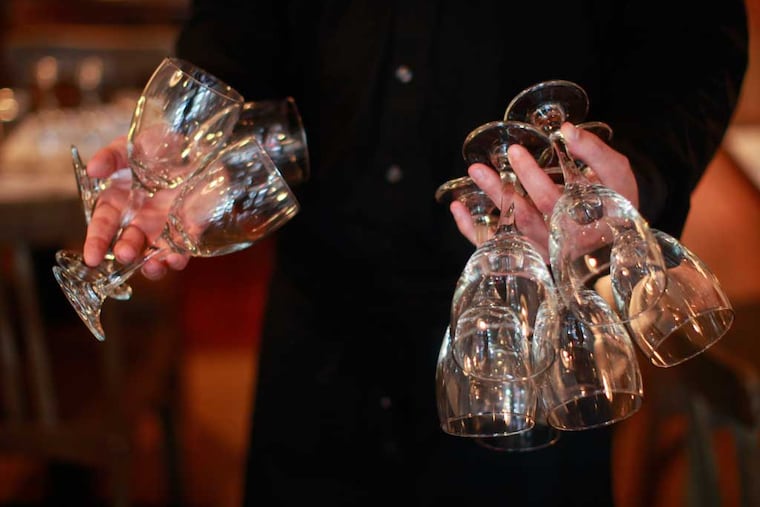A double whammy for those seeking specialty wines and spirits in Pennsylvania: A ‘surprise’ fee increase and bugs in the ordering system
The PLCB's new ordering system has stalled deliveries of special-order wines and spirits. At the same time, an increase in a state-imposed fee may lead to higher prices for consumers.

Looking forward to a glass of 2020 Domaine Thierry Mortet Gevrey-Chambertin, or perhaps a nip of Pusser’s British Navy rum, or any of the thousands of other upmarket wines and spirits sold through the Pennsylvania Liquor Control Board’s special-order system?
Be prepared to pay more.
That is, when you can get these prized bottles, which are not sold in the state’s Fine Wine & Good Spirits stores and are available only by special order.
Technical issues have beset the new version of PLCB’s special-order system, which went online last week, slowing the flow between distributors and customers to a trickle. Many of these orders — destined to bottle shops, high-end restaurants and wine bars, and everyday people with champagne tastes — have now been delayed by about two weeks.
A PLCB spokesperson said a team was working round the clock on a fix for the system, known as the Licensee Online Order Portal (LOOP).
To compound bar managers’ frustrations, in an unrelated move, the PLCB recently raised its handling fee on many special-order bottles. The fee — formally known as the logistics, transportation, and merchandising factor, or LTMF — is now a flat $2.47 per bottle.
Previously, the LTMF was based on product type and size — adding $1.37, for example, to a typical 750mL wine bottle. But the LTMF, applied to special orders delivered to a store or licensee service center, is also subject to the state’s 18% emergency tax (the so-called Johnstown flood tax) as well as sales tax. In Philadelphia, where that is 8%, the same bottle now costs an additional $1.40.
The fee change, included in the PLCB’s Special Order Program Guide released in June, caught many bar owners by surprise, said Joe Massaro, president of the Pennsylvania Restaurant & Lodging Association, a trade group. (Six months ago, the PLCB raised prices 4% on many popular items available at its stores with 10 days’ notice.)
Special orders account for only about 5% of the PLCB’s annual sales, but some bars, such as the two Tria Cafes in Center City, sell these bottles exclusively.
Bars may have to pass along at least some of the increase to customers, said Jon Myerow, an owner of Tria, who said the fee change would amount to nearly $20,000 per year at his company. “That’s a huge cost increase for two small wine bars,” he said.
Myerow agreed that a new system was needed because it took Tria wine director Lauren Harris “two or three times as much time to order wine than it should because the system would always crash.” Myerow said Harris — who knew that she would be on vacation when the new LOOP system started — “triple ordered [in advance], knowing it would not work, so we’re actually in pretty good shape.”
The PLCB spokesperson, who said “hundreds of orders have been processed” via LOOP, said some challenges had been expected, but “we are happy to say the vast majority of licensee and retail business has continued without interruption.”
Bar owners and distributors interviewed Monday and Tuesday suggested that this was not always the case.
In the month’s roll-up to the relaunch of LOOP, the PLCB stopped allowing distributors to register new items for the system. For about a week, the entire system was shut down to prepare for the transition.
Users complained that LOOP had bugs from its relaunch. Massaro, of the restaurant association, said many issues were user errors and were to be expected. “But as the days progressed and we started to receive additional concerns from members, it was apparent there was a technology problem as well,” he said Tuesday.
The PLCB emailed customers recommending that they change their password, which would improve access. “We understand there’s disruption and we apologize for that,” the PLCB spokesperson said.
Jason Malumed of MFW Wine Co., a distributor, said he used to be able to select whether he wanted to have a special order of wine shipped directly to a restaurant or to a state store. “We were not able to select orders to ship to a store,” he said. “Orders would appear for them one minute, then magically disappear.”
Malumed said the system would also not allow his company to create an order for direct delivery unless a delivery fee was added. He said he did not want to charge a restaurant for this, “but if I create an order with no supplemental delivery fee, the restaurant is not able to approve it.” To work around that, Malumed said he added a nominal $1 fee.
Malumed’s company is one of two plaintiffs in a long-running court case over the PLCB’s failure to allow direct shipment of special-order wines to restaurants — instead of to a state store — as a 2016 law required.
Commonwealth Court found the agency liable for damages, interest, and lawyers’ fees. The case is headed back to the Pennsylvania Supreme Court for the second time after the board appealed its defeat. Meanwhile, the PLCB last year allowed merchants to ship wine directly to licensees, five years late.